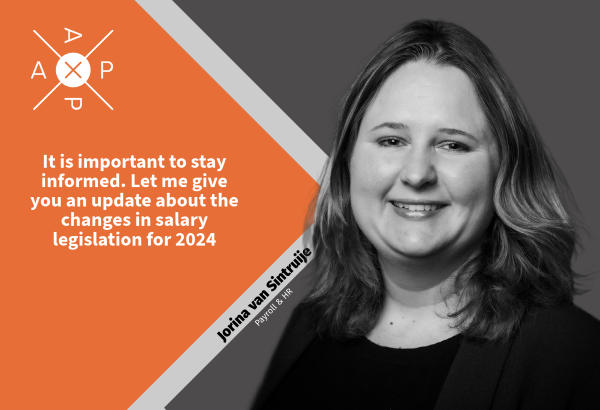Salary administration in 2024

The year 2024 has started and that means there are adjustments to salary-related rules once again. For entrepreneurs, understanding how these changes will impact their finances is crucial. In this article, our colleague from the salary administration department, Jorina van Sinttruije, will guide you through the changes for 2024.
30% ruling
In 2024, the 30% ruling will be scaled back. Starting from then, there will be a cap on the 30% ruling applied to the salary above the so-called Balkenendenorm (WNT norm), which is €223,000 in 2023. This cap, previously announced in last year’s Tax Plan, takes effect on January 1, 2024. There is a transitional arrangement for employees who already received the 30% ruling in December 2022; they will experience the cap starting January 1, 2026.
Over a 5-year period, the 30% ruling will gradually decrease to a 10% ruling. Specifically, during the first 20 months of this period, 30% of the salary can still be reimbursed tax-free. In the next 20 months, this percentage drops to 20%, and during the last 20 months, the tax-free reimbursement is 10% of the salary. This ruling still needs approval from the Senate.
Labor law vacation days
The expiration of the limitation period for statutory vacation days requires employers to inform and regularly update employees promptly, even in the case of illness.
Recruitment and selection
For companies with more than 25 employees, it is necessary to document the recruitment and selection procedure in writing and publish the advice on the website. In cases where there is no suspicion of a procedure in companies with fewer than 25 employees, the supervisor can set the required standards in writing. The retention period for this documentation is 3 years.
Mobility
From July 1, 2024, business mobility within the Netherlands will undergo significant changes. Employers will be obliged to provide detailed data on both commuting and business travel of their employees at that time. The primary goal of this mandatory reporting is to strive for CO2 reduction.
This obligation primarily applies to employers with 100 or more employees. They must provide accurate data on all business trips and commuting of their employees within the Netherlands. Certain exceptions apply, specifically for travels where employees receive a financial compensation or are provided with a vehicle/transportation ticket.
The required reporting includes details such as the number of kilometers traveled (annual totals), the mode of transportation used, and the type of fuel. Employers must submit this data for the year 2024 by June 30, 2025.
Youth wages
Starting the new year, the wage threshold for the Low-Income Advantage (LIV) will be set between 100% and 104% of the minimum wage. Additionally, a change will occur for Youth LIV, which will be abolished from January 1, 2024. Another significant change in 2024 is the entry age for retirement, which will be set at 18 years from that moment on.
Minimum wage
Starting January 1, 2024, it will be legally mandatory for employers to pay employees at least the applicable minimum hourly wage. This new legislation applies to all employees aged 21 and older, introducing a fixed minimum hourly wage.
For employees under the age of 21, changes are also on the horizon. From January 1, 2024, fixed minimum youth wages per hour will be established, derived from the statutory minimum hourly wage. These adjustments follow the same policy as in 2023.
Rates: As of January 1, the minimum hourly rates are as follows:
- Minimum hourly wage: €13.27
- Monthly wage based on 40 hours:
- 21 years and older: €2,300.13
- 20 years: €10.62, €1,840.80
- 19 years: €7.96, €1,379.73
- 18 years: €6.64, €1,150.93
- 17 years: €5.24, €908.27
- 16 years: €4.58, €793.87
- 15 years: €3.98, €689.87
Special rate 2024
The special rate prevents excessive taxation on extra income such as holiday pay, bonuses, and severance pay. It also guards against a higher tax bracket due to these incomes. Employers must apply this rate to irregular or one-time payments. For 2024, the special rate percentage varies depending on your income from the previous year, as determined by the Tax Authorities in the special remuneration table 2024. Changing an excessively high special rate must be requested from the tax authorities. If the special rate is too low, the employer must obtain written permission from the employee to adjust it.
Usual salary director-major shareholder
The prescribed salary that a director-major shareholder (DMS, dutch DGA) must include at least is increased from €51,000 in 2023 to €56,000 in 2024. This increase reflects an adjusted norm to promote fair compensation for the DMS, who combines their role as a director and major shareholder.
Overview standard amounts and percentages 2024
The following overview shows how much an employer can reimburse tax-free or what amount should be considered as salary in a reimbursement or provision:
- Exemption business kilometer allowance €0.23 (2023: €0.21)
- Exemption home office allowance €2.35 (2023: €2.15)
- Taxable value non-business meal €3.90 (2023: €3.55)
- Taxable daily value living in and housing at the workplace €6.70 (2023: €6.10)
- Free space work-related cost scheme up to €400,000 payroll 1.92% (2023: 3%)
- Free space work-related cost scheme for payroll above €400,000 1.18%
- The maximum premium income rises to €71,628 in 2024 (2023: €66,956)
Do you have questions about salary administration, or would you like more clarity on how these regulations specifically apply to your situation? Feel free to reach out. We are ready to answer all your questions and provide you with the necessary information.




